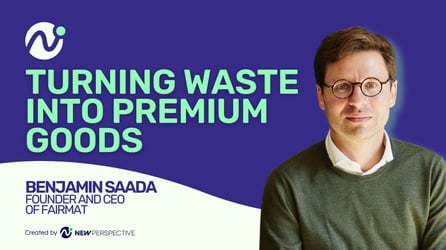Episode Info
Recycling and sustainability are big challenges today, especially with plastics and materials science. Our recycling systems are flawed, and many people aren't aware of the issues, making environmental problems worse.
Dr. Kristoffer Stokes and his team at Geisys Ventures are tackling these problems head-on with innovative solutions for plastics and manufacturing. Their cutting-edge technology, D-glue, makes it easier to recycle and repair products made from mixed materials.
In this episode, we talk about the hurdles in recycling, how Geisys Ventures is addressing them, and the importance of reducing consumption and fixing products. Dr. Stokes also shares success stories and advises anyone wanting to make a positive impact on the environment.
🎧 Listen or watch the episode
👤 Interview with Dr. Kristoffer Stokes
Dunja Jovanovic: Can you introduce yourself and tell us a bit about your company, Geisys Ventures?
Kristoffer Stokes: I'm Dr. Kris Stokes, the principal scientist at Geisys Ventures. We focus on material science, including R&D management consulting to accelerate product development, manufacturing process improvements, and R&D product development. My background is in polymer chemistry. I hold a PhD from MIT and previously worked at a startup company in the oil and gas chemical sector, which had a successful exit. I've also worked at a company manufacturing battery components and served as the global director of product development for an adhesive company.
DJ: What inspired you to start Geisys Ventures, and what specific problems are you aiming to solve?
KS: We focus on solving issues with plastics and plastics manufacturing. We're working on projects that improve sustainable products, such as recycling party cups into new fibers and collaborating with medical device companies. Our main focus is on addressing plastics processing issues.
DJ: What do you see as the main limitations in the current recycling infrastructure for plastics?
KS: The current recycling infrastructure has a few issues. Firstly, our collection systems aren't optimal. For example, in my town, we have free recycling for plastics and metals, but people don't always know what materials are acceptable, leading to mixed recycling. This mix complicates the process because only certain types of plastics, like numbers 1 and 2, are meant to be recycled, yet all numbered plastics get dumped in. Secondly, aiming for a circular economy is challenging due to our current manufacturing processes. In the adhesives world, for example, glue is used extensively to reduce labor, increase product longevity, and for light-weighting. These factors make recycling difficult.
DJ: Do you think we need more education on recycling plastics? People often assume all plastics can be recycled. How do product design and material selection by manufacturers affect recyclability?
KS: Absolutely. A great example is Ferrero Rocher chocolates. Each chocolate is wrapped in foil with a sticker, placed in a cup with hot glue, then packaged in thermoformed plastic, and finally in a hard plastic case. This excessive, mixed-material packaging complicates recycling.
DJ: So, when people want to recycle Ferrero Rocher packaging, they might not realize each part should be recycled differently, and some parts aren't recyclable at all.
KS: Exactly. Most of it should probably go in the trash because many areas, like my town, don't accept polypropylene.
DJ: You get a small tasty dessert, but it comes with a lot of unnecessary packaging that isn't recyclable and ends up in a landfill. We should be more environmentally conscious while enjoying our treats, right?
KS: Absolutely. We need to find ways to have our cake and eat it too.
DJ: You're working in the adhesive industry. What solutions are you offering to improve this situation?
KS: While at the adhesives company, a large customer repeatedly asked for a defleatable adhesive. Traditional adhesives don’t allow for easy disassembly and recycling. In 2020, during the pandemic, I collaborated with my college friend, Professor Phil Costanzo at Cal Poly, who was working on reheatable coatings. We repurposed this technology to create a new glue, D-glue, which can be de-bonded at the end of its life to recover valuable materials.
DJ: You mentioned using glue in products like shoes or electronics. How does your adhesive enable manufacturers to recycle their products?
KS: Our adhesive technology allows for easy disassembly, aiding in manufacturing rework, repair, and recycling. It's especially important for mixed materials, which are challenging to recycle. Right to repair is a growing area, and our adhesive can support this market by allowing for easier disassembly and recycling of mixed material products.
DJ: Is your product on the market yet? Can companies buy and use it?
KS: We're currently at the proof of concept stage, working with large companies to scale up and commercialize D-glue. We're also fundraising to spin out the company and bring the product to market because we believe in its potential.
DJ: How significant is consumer behavior in recycling, and what strategies can encourage more effective recycling habits?
KS: Consumer behavior is crucial. Over the past 50 years, we've been trained to use and dispose of products quickly. Increasing awareness of repairable and sustainable products, demanding legislation, and holding companies accountable are essential. Consumers need to push for products that can be repaired and recycled. Every company wants to sell more products, but we need to shift towards sustainability.
DJ: What impact do government policies and incentives have on recycling rates?
KS: Government regulation is essential. Europe has been leading sustainability efforts for years, and the US often follows suit due to market shifts. Economic incentives for using recycled materials are needed. For example, recycled polyester costs 30% more than virgin materials, creating a disincentive to use recycled materials.
DJ: Recycling rates vary between regions. What lessons can be learned from areas with high recycling rates?
KS: When I lived in Denmark in 2000, one of the things that really impressed me was the practice of reusing bottles. Every beer bottle was made of thick, durable plastic. After use, you'd return the bottles to the store, and they would be reused. These bottles often had scuff marks, a sign of their repeated use. As consumers, we need to become more accepting of minor cosmetic defects. Of course, we shouldn't tolerate issues like leaking bottles or chemical leaching, but we should embrace the idea of reusing items whenever possible.
DJ: Do you have any success stories from Geisys Ventures that contributed to clients' sustainability journeys?
KS: We've worked with New Norm Fabrics on recycling materials. Lauren Choi, who is enthusiastic about sustainable solutions, has been pushing her recycled party cup textiles. We've been collaborating for a year, and she recently launched her shop with apparel made from these textiles.
DJ: What advice would you give to entrepreneurs focusing on sustainability, repair, recycling, and the circular economy?
KS: Persistence is key. The sustainable world has many starts and stops. My colleague Phil and I have been applying for funding and government grants for almost four years. This isn't a quick process like software development; it takes time, effort, and some luck. Keep at it; you're doing the right thing.
DJ: How important is marketing in this process?
KS: Marketing is crucial. You need to simplify your technology to its core essence and have a compelling demo. We're working on creating a compelling demo to capture attention. Simplify the technology so everyone can understand it, even if it's complex.
DJ: What motivates you to continue working in the field of sustainability?
KS: It's a personal motivation. My past work in the oil and gas field made me feel a sense of responsibility to contribute to sustainability. With four kids, I want to leave a better world for them. Despite the vilification of plastics, I believe technical solutions can help us move forward.
DJ: What advice would you give to everyday people who want to make environmentally conscious choices regarding repairs and recycling of plastics and textiles?
KS: The first piece of advice I give people is to reduce their consumption. We should all be mindful of how much we consume and try to cut back wherever possible. I admit I struggle with this too, but I make an effort to be aware of my consumption habits and reduce them as much as I can. Another key point is to repair your belongings. Keep them maintained and in good working order so they last longer. For example, my 15-year-old son recently got excited about this. His Xbox controller broke, and instead of discarding it, we found a tutorial online and he learned how to fix it himself.
📝 Full episode transcript
📚 Episode resources and links
-
Website: https://www.geisysventures.com/
-
LinkedIn: https://www.linkedin.com/company/geisys/
🎧 Subscribe to our podcast
- Spotify: https://bit.ly/3PSWIyI
- Apple Podcasts: https://bit.ly/3RvlHte
- YouTube: https://bit.ly/3RDzkXg
- Deezer: https://bit.ly/3PvQaof
- Amazon Music: https://bit.ly/3PQlijS
💬 Follow GNP on Social
Host & Co-Producer: Dunja Jovanovic
Executive Producer: Marko Bodiroza
Creator: Nathan Harris
Video & Sound Editor: Marija Davidoski




